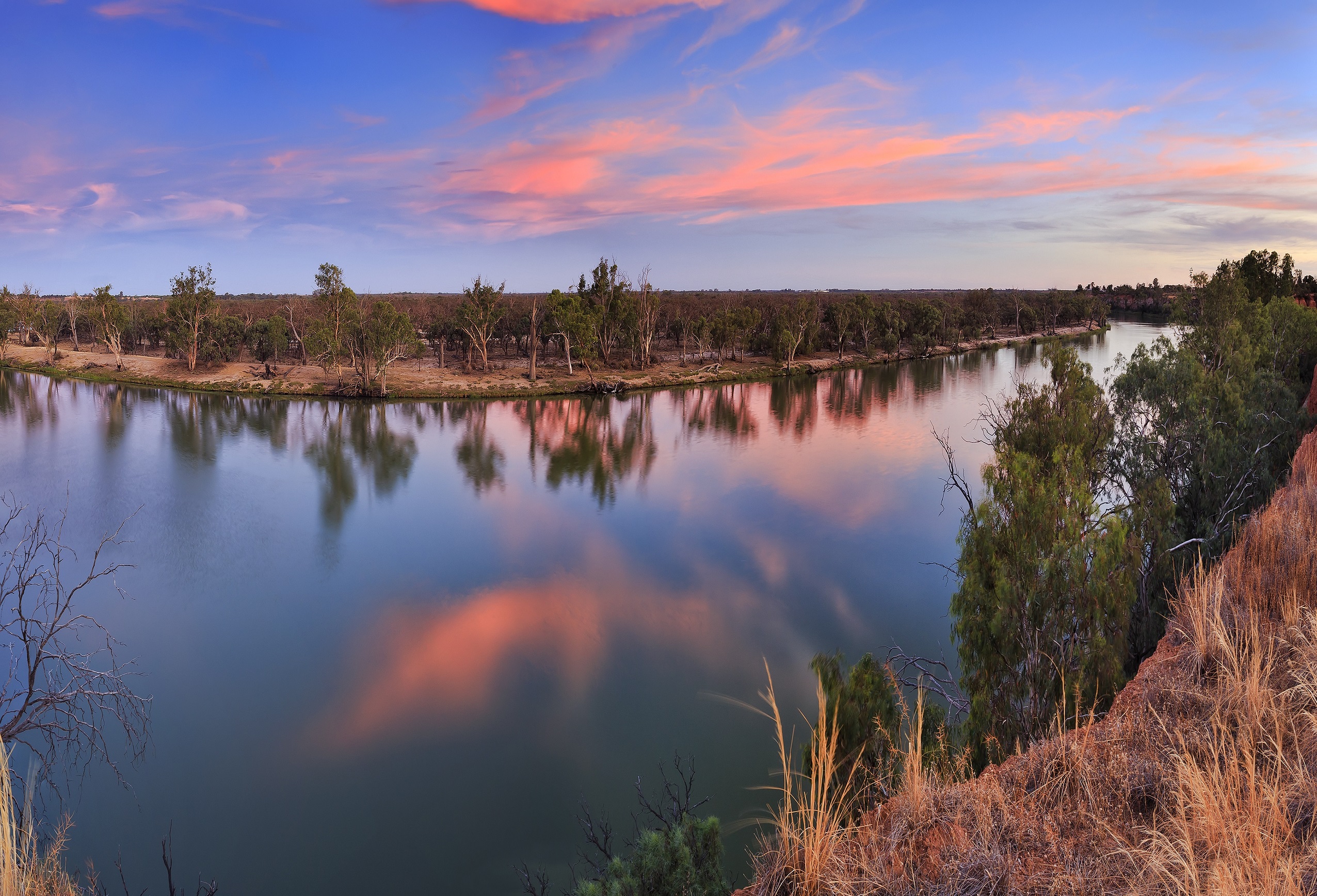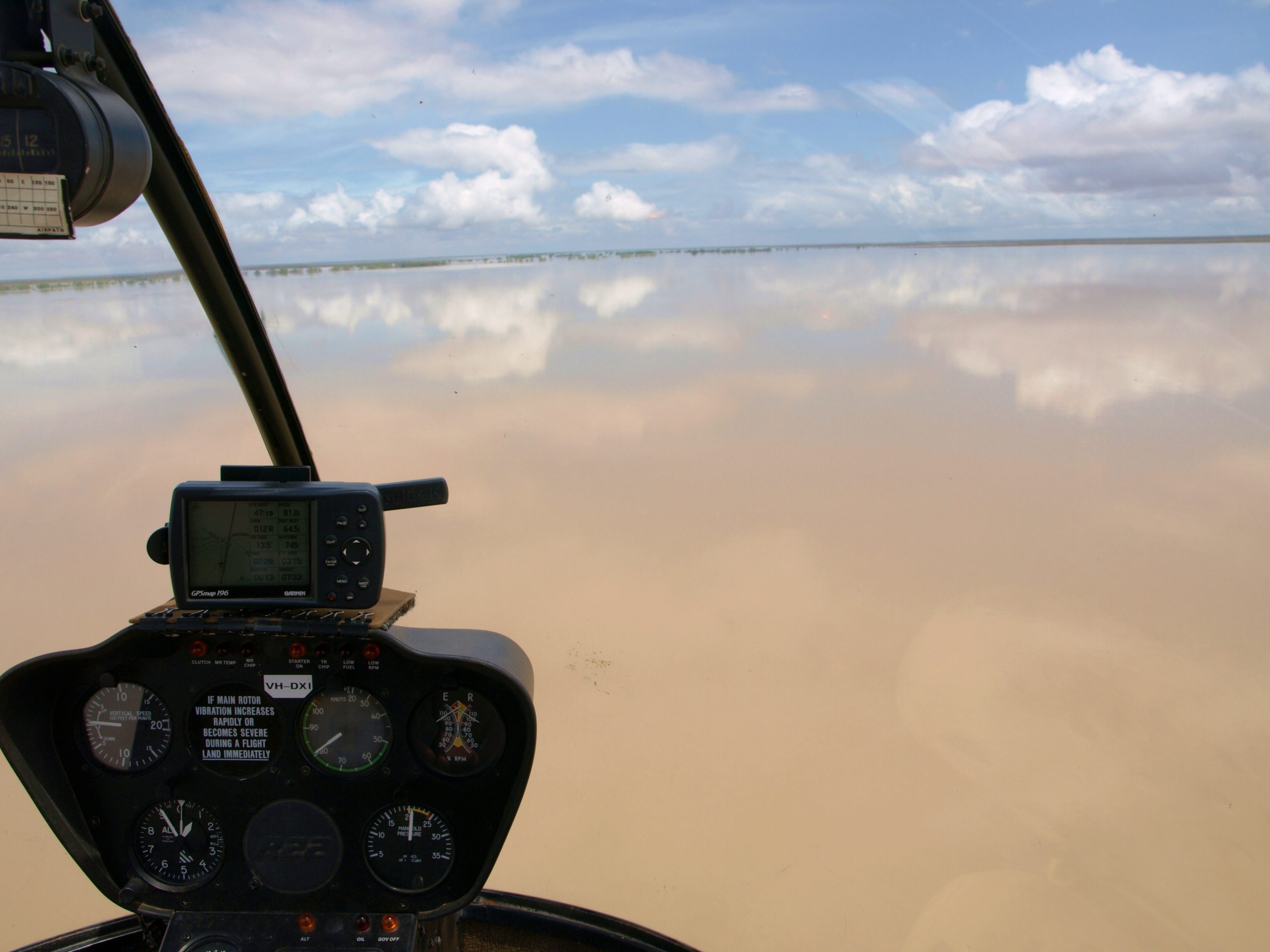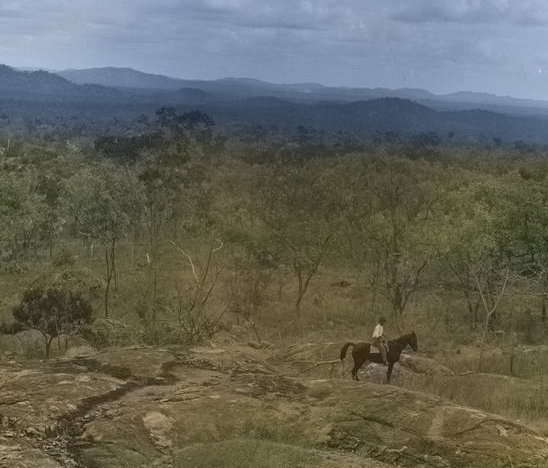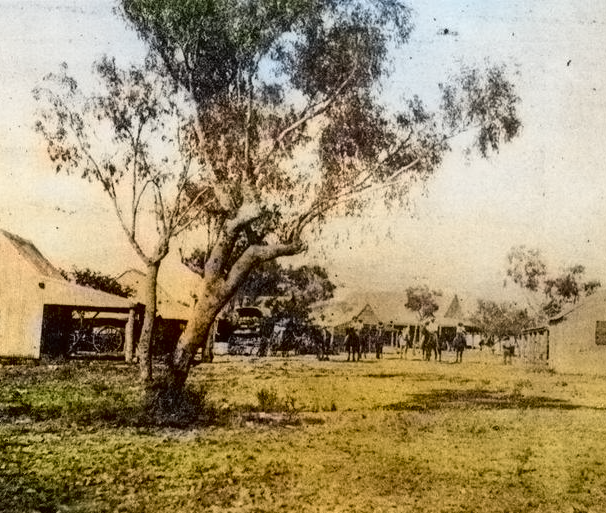
One early morning in the beginning of April, I rose, left the bunk house and headed outside. The Gulf waters were mirror-calm in the distance and the air felt drier and cooler than it had in all the months since my arrival. As I walked, listening to the chatter of a pair of blue-wing kookaburras in the carbeen trees, I was surprised to see Kitty waiting for me. She was carrying a dilly bag with some tucker and a canvas water bag that looked like it had seen better days.
I walked across to greet her. ‘Hello Kitty, you’re up here early.’
Grunting a low greeting she turned her pearl-shell eyes away. ‘Might be you an’ me go drive in your car,’ she said. It wasn’t really a question.
I was surprised. I had plans for the day, and my little Riley motor car had not travelled more than five miles since I arrived at the mission. ‘Where do you want to go?’
‘Three days out bush, all up, maybe. No more.’
‘I guess we can, if you want to. Will you give me an hour to get ready?’
Kitty nodded, and sat down on the grass. She had her pipe out, but looked around carefully before she lit up. The Brethren had a thing about women smoking, though they didn’t seem to mind the same activity being practiced by the men.
While Kitty smoked I cleared the trip with Len Akehurst, cadged a full tank of fuel and a couple of jerry cans, then packed the gear I’d need for a few nights of sleeping rough. Dorothy gave me a box of rations for the trip, and tutted at my frustration at not knowing the destination for our journey.
‘Feel privileged,’ she said. ‘Old Kitty trusts you, and that’s a precious thing.’
We drove out, dodging bog-holes still treacherous after the wet season. After an intrepid day’s travel, talking only intermittently, we camped the first night on the Nicholson River. At bed-time I stretched out on the back seat of the car and Kitty curled up beside the fire, snoring softly as she slept.
The next day we forded the river at Corinda, and followed trails that were worse still than those of the previous day, crawling along a bridle track through stations with names that remain implanted on my memory: Merton Vale, Hinton, Lochinvar and Lincoln. Kitty directed me with sharp commands, showing a sense of direction that was uncanny in a strange world of twisted scrub and termite hills.
Eventually we came up to a place from which we could see the complex of buildings around the Lawn Hill Station homestead. We saw men, dust, a motor truck, and someone bringing a mob of horses into the yards. Kitty asked me to stop the car.
Sitting cross-legged on the dry grass, she began to cry, fat drops falling from her eyes, and a low, throaty keening sound emanating from deep down in her chest.
It was the twenty-seventh of October, in the year 1889, a fateful day in the history of Queensland’s North. Joe Flick had been awake all night, and now lurked restlessly on the fringes of the station’s home paddock, waiting for an opportunity to replace the magnificent but wild horse that had fought him every step through the dark hours. Tired of running, Joe was filled with a burning anxiety, a desperation to bring on the climax he now knew must now come.
Watching Wavell’s party of police arrive and head into the station, Joe knew that he had to act. He waited until they were in the mess eating breakfast before opening a wire gate and riding in. There were plenty of good mounts there, some of which he remembered from doing stock work for Frank Hann.
Dismounting, Joe had the saddle and bridle off in a moment. Carrying both, he approached one of the station horses, yet when he took a step forward the animal whinnied and backed away.
‘Come on boy,’ he said, forcing himself to relax, clicking his tongue and talking quietly. Reassured, the gelding allowed him to come close, at which point Joe put the saddle on the ground. After gently petting the horse’s neck he slipped his right forearm around the off side of its head, effortlessly sliding the bit between its teeth with his left hand, then adjusting the crown over his ears. The saddle followed, all very quickly done, and all without alarming the horse.
Joe had just tightened the girth and mounted up when an armed contingent reined in at the top of the rise. Two Native Police troopers began to walk their horses down towards him, rifles extended.
Joe cried ‘Yah,’ and dug in his heels. Within ten paces he was galloping at full tilt, the humid-hot air on his face, and dirt flying from pounding hooves. In a fateful decision he rode not away from the troopers, but towards them, splitting them neatly.
The first shot directed towards Joe disrupted the air around his ears, yet he did not flinch. Headed directly towards the homestead now, he jumped a fence and bypassed the armed party, a move that they had not expected.
Bullets, however, fly faster than a man can ride. Whipping and cracking through the air, one soon found its mark, taking Joe’s new mount in the chest and bringing him down in a tumbled heap. Joe freed his feet from the stirrups, then sprinted for the nearest of the outbuildings.
‘He’s unarmed,’ Alfred Wavell cried from the saddle, his voice carrying clearly. ‘Now’s the time, boys. Bring him down.’
Joe, however, was fast and elusive, soon reaching the relative safety of a small stone hut. The door was closed but unlocked. He twisted the handle and shoved with his shoulder. Inside were stacked bags of lime and cement, heavy iron tools and some old harness. No weapons. Joe swore to himself, and hurried out the way he had come.
Looking around the corner to see the police dismounting and preparing to follow, Joe ran for the next building; an old dining room that now served as a bunkhouse for the head stockman. Inside, rummaging in and around a cupboard he located a revolver. Mounted on a gun rack he found a Greener choke-bore shotgun. Cartridges for both firearms were on a shelf.
Feeling more positive now that he was armed, Joe barricaded himself inside the hut, forcing a table against the door, knowing that police and station staff would be taking cover all around. After loading both shotgun and revolver he opened the window shutters. From surreptitious movement and the sound of furtive voices he realised that most of the police were now behind cover nearby.
Joe glared out the window, sweat dripping from his hair and coating his wiry arms. The gun felt good in his hands, with the stock resting on the window sill.
Five minutes passed, then a voice called: ‘Joe Flick, listen to me.’
The words came from behind the station store.
‘My name is Senior Constable Alfred Wavell. I want to talk.’
‘Go on then,’ yelled Joe. ‘Talk.’
Wavell showed himself, walking out from behind the store and slowly coming closer. His revolver was in its holster, and he carried no other weapon. ‘Surrender now,’ the policeman said. ‘We have armed men on all sides. Walk out of the building with your hands up or face the consequences.’
Wavell had made a fatal mistake. Whether it was the dysentery affecting his mind, or just a moment of carelessness, he came too close. Too far from cover. Too late to run. Most fatefully of all, he had misjudged Joe Flick’s state-of-mind.
Joe sighted on Alfred Wavell’s chest, and held his aim despite the trembling inside. The years of being called Yella Joe and counted as something less than a man; the months of running; the taunts; the gunshot wound in the back; the sixteen court appearances in Palmerston, and the way that they had tricked him into thinking that he had been released, had all built inside him to a rage he could not control.
Now, in an instant of time that could never be taken back, Joe squeezed the trigger and the tightly-packed charge of pellets struck Wavell in the chest. The policeman reacted with that strange little leap of a heart-shot animal, then crumpled without a cry and barely a tremble.
Joe felt a great calmness descend on him as he watched the policeman’s blood stain the earth, and listened to the horrified exclamations of the men still hidden behind the outbuildings.
No one came out to try to take Wavell’s body. It lay there, mourned only by clouds of flies and shrouded in heat, a long way from his mother and his birthplace on the Isle of Wight.
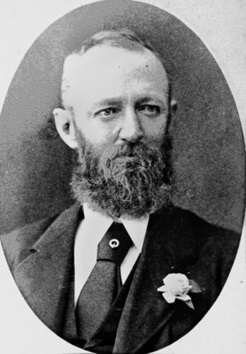
For a long time Joe was left to his own thoughts and the ravages of his conscience. Fittingly, that afternoon a storm swept in, darkening the sky and smelling of sweet rain after the terrible heat of the day. It brought deep rumbles and spears of lightning from clouds blacker than pitch.
Frank Hann rode back from a day of ‘dispersing’ blacks with blood on his shoes and a Martini-Henry rifle in his hand. A bandolier of cartridges hung diagonally from one shoulder.
Opal met her man at the house fence, flinging her arms around him as soon as he had dismounted. ‘Murder, murder,’ she cried. ‘There’s been murder done here this day.’
‘Was it Joe Flick that done it?’
‘Yes, it was Joe.’
‘Who did he kill?’
‘Constable Wavell.’
‘Damn him,’ Hann snorted. ‘How did it come to this?’
Hann gave her his horse to see to, and conferred with Doyle, listening to the story grimly before walking around the side of the store. There he saw Wavell’s body still lying where it had fallen, on the ground near the old dining room, in the light rain that had just started to patter on the cane-grass thatch roofs.
The station owner turned back to address the two troopers, Noble and Garrie, along with the house-slave Nym. ‘Hadn’t any of you the gumption to fetch in Alfred’s body? Shame on you.’
Still holding his loaded rifle, Hann walked out in the open. He was not a big man but he prided himself on his pluck. ‘Joey,’ he called, ‘don’t shoot. You know I’ve not done you a wrong turn in all my days.’
‘Go back, Mr Hann,’ cried Joe.
‘For the love of God, why did you do it, Joey? Come out of there now.’
‘I won’t come out.’
Hann walked to Wavell’s body, squatted beside it, and examined the wound. ‘It’s a terrible thing you’ve done, Joey.’
‘If I hadn’t shot Wavell he would have shot me,’ Joe said, his voice almost breaking with the strain. ‘I suppose they’ll hang me for this.’
Hann stood up again. ‘That’s true enough, but there’s a chance that if you surrender now the judge will look kindly on it.’
‘Perhaps,’ Joe said, then whispered. ‘Yet I lived my life saying yes sir and no sir, and taking kicks and slaps from men like you. Could you promise me that they won’t clap irons on me? I swore I wouldn’t let that happen again.’
Mistakenly taking this as some kind of promise, Frank Hann walked around to the front door of the hut, and pushed it open, forcing back the table barricade. As the door swung open, and in a flash of lightning, Hann saw Joe’s sweating face, and the tense muscles of his hands holding a revolver. Then came a heavy boom, the muzzle flash. The ball struck Hann’s chest and passed out between his shoulder blades.
Hann fell to his knees, and raised his Martini Henry. He fired once, though the bullet went astray. Bleeding badly and afraid that the killing shot would come next, Hann staggered back to where Doyle remained behind cover. The older man took his shirt off and used it to bind the wound.
‘The treacherous snake,’ Doyle swore.
Almost sick with pain, Hann sagged against a wall, sorely hit. ‘Fire on him, kill him. Joe Flick has gone to the devil now.’
Continues next week
©2019 Greg Barron
